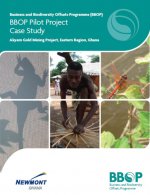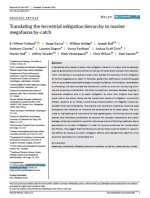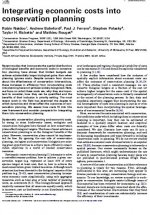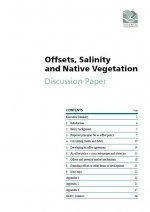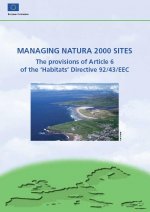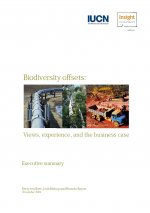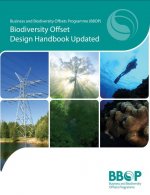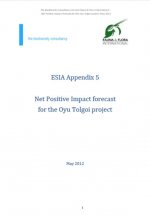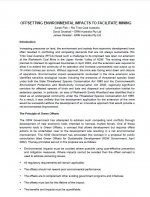Newmont Mining Biodiversity Offset Case Study – 2009
Case study of Newmont Mining BBOP pilot biodiversity offset at the Akyem gold mine, Ghana. Published in 2009.
Biodiversity offsets: relative offsetability of impacts.
Unpublished report to the New Zealand Department of Conservation. The Biodiversity Consultancy Ltd.: Cambridge, UK.
The Biodiversity ConsultancyThis report has been prepared for the Biodiversity Offset Program (BOP) of the New Zealand Department of Conservation to help advance offset thinking in New Zealand and as a contribution to the Business and Biodiversity Offset Programme1, of which BOP is a member. Given the pioneering nature of the subject, it is not intended as […]
Translating the terrestrial mitigation hierarchy to marine megafauna by-catch
In terrestrial and coastal systems, the mitigation hierarchy is widely and increasingly used to guide actions to ensure that no net loss of biodiversity ensues from development. We develop a conceptual model which applies this approach to the mitigation of marine megafauna by-catch in fisheries, going from defining an overarching goal with an associated quantitative […]
Inegrating economic costs into conservation planning
Robin Naidoo, Andrew Balmford, Paul J. Ferraro, Stephen Polasky, Taylor H. Ricketts, Mathieu Rouget - Conservation Science Program,, Conservation Science Group, Department of Economics, Department of Applied Economics, Conservation Science Program, South African National Biodiversity InstituteRecent studies that incorporate the spatial distributions of biological benefits and economic costs in conservation planning have shown that limited budgets can achieve substantially larger biological gains than when planning ignores costs. Despite concern from donors about the effectiveness of conservation interventions, these increases in efficiency from incorporating costs into planning have not yet been […]
Offsets, Salinity and Native Vegetation: Discussion Paper
Government of AustraliaThis discussion paper examines whether, and how, the negative impacts of clearing native vegetation might be offset by separate actions that have positive impacts. Offset actions could include improving the management of existing native vegetation, restoring or regenerating an area of degraded vegetation, or revegetating a previously cleared area.
Managing NATURA 2000 Sites: The Provisions of Article 6 of the Habitats’ Directive 92/42/CEE
European UnionThe first chapter of Directive 92/43/EEC, comprising Articles 1 and 2, is entitled Definitions. This chapter sets out the aim of the directive which is to contribute towards ensuring biodiversity through the conservation of natural habitats and of wild fauna and flora in the European territory of the Member States to which the Treaty applies […]
Biodiversity Offsets: Views, Experience, and the Business Case Executive Summary
Kerry ten Kate, Josh Bishop, Ricardo BayonBiodiversity1 offsets are conservation2 activities intended to compensate for the residual, unavoidable harm to biodiversity caused by development projects. Recent experience with regulatory regimes, such as wetland and conservation banking in the USA, tradable forest conservation obligations in Brazil and habitat compensation requirements in Australia, Canada and the EU, has been supplemented by growing interest […]
Biodiversity Offset Design Handbook
2012 Update
BBOPThe updated Offset Design Handbook presents information on a range of issues, approaches, methodologies and possible tools from which offset planners can select the approaches best suited to their individual circumstances when designing a biodiversity offset. It describes a generic process that offset planners could use in designing a biodiversity offset, from initial conception of […]
TBC and FFI (2012) Oyu Tolgoi Net Positive Impact Forecast
Unpublished draft report of The Biodiversity Consultancy Ltd and Fauna & Flora International, May 2012
The Biodiversity Consultancy Ltd, Fauna & Flora InternationalThis appendix forecasts the theoretical and technical feasibility of the Oyu Tolgoi project achieving a Net Positive Impact (NPI) or No Net Loss (NNL) on biodiversity. Residual losses, which are the losses remaining after the mitigation hierarchy of avoid, minimise and restore has been followed, were estimated for each priority biodiversity value. Biodiversity gains at […]
Offsetting Environmental Impacts to Facilitate Mining
Sarah Fish, David Snashall, James SteaterIncreasing pressures on land, the environment and society from economic development have often resulted in conflicting and competing demands that are not always sustainable. Rio Tinto Coal Australia (RTCA) faced such a challenge to its proposed new open cut extension at the Warkworth Coal Mine in the Upper Hunter Valley of NSW. The existing mine […]


